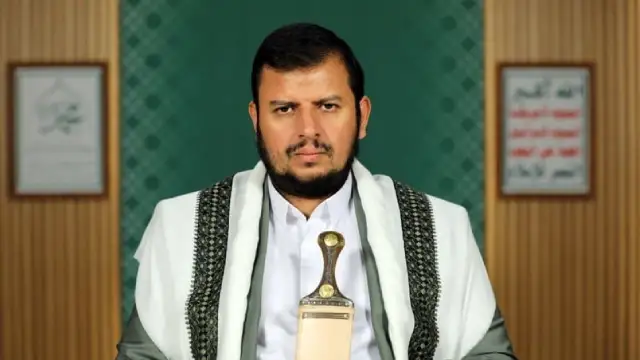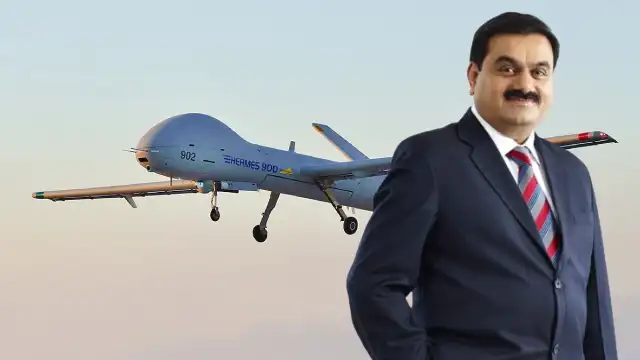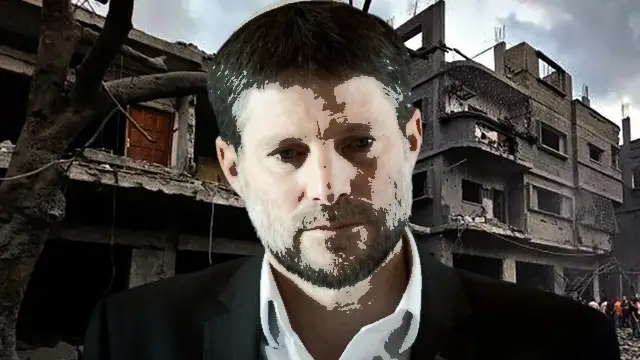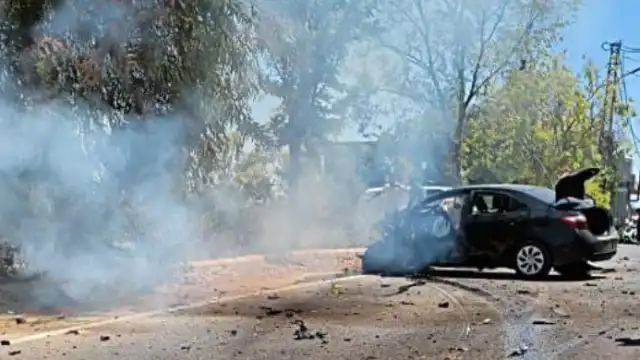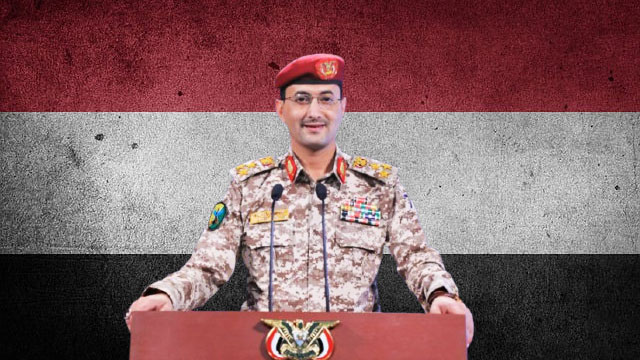The missiles launched from Yemen towards Tel Aviv carry a message that reverberates beyond the troubled waters of the Red Sea. As the Yemeni Armed Forces claimed they have attacked Tel Aviv’s Ben Gurion Airport—called Lod Airport in the occupied Yaffa region as per Palestinian lexicon—the Houthi leader delivered a fierce condemnation of Israel’s Gaza aggression on Thursday, positioning Yemen as the lone state actor willing to confront what he calls a “genocide”.
Ansarallah chief Sayyed Abdulmalik Badr El-Din Al-Houthi’s video address marked another escalation in Yemen’s campaign against Israel.
The Iran-backed leader claimed his forces struck targets in six Israeli cities this week, including Tel Aviv, Haifa and Ashkelon. These attacks represent Yemen’s response to what Mr Abdulmalik describes as American-Israeli aggression that has killed or wounded more than 3,500 Palestinians.
Mr Abdulmalik’s speech coincided with a press statement issued by Brigadier General Yahya Saree, the spokesperson of the Yemeni Armed Forces, which claimed their missile forces used “Palestine-2” hypersonic ballistic missile to strike the Ben Gurion Airport, forcing the settler occupiers into shelters while disrupting the airport’s operations.
“The genocidal truth in the Gaza Strip has imposed itself even in Western societies,” the Houthi commander declared.
His government, which is not widely recognised, maintains a naval blockade across the Red Sea, targeting shipping linked to Israel despite facing retaliatory strikes from the Zionist state, and even the Americans a few months ago.
The Houthi leader’s statement and the Yemeni Armed Forces’ claim of hitting Israel highlight that Sana’a remains consistent in its military endeavours to stop the attacks on Gaza.
Yemen’s Houthi leader exposes Saudi Arabia’s nexus with Israel
Apart from Israel, the Houthi leader’s sharpest criticism targeted fellow Arab states.
He singled out Saudi Arabia for particular scorn, alleging that the Saudi vessel Bahri Yanbu transported weapons to Israel while Norwegian funds boycott Israeli investments.
Italian dock workers recently stopped a Saudi ship they claimed carried arms bound for Israel, though the Kingdom’s shipping corporation denied the allegations.
This confrontation carries deep irony.
Yemen’s Ansarallah and Saudi Arabia fought a devastating war that killed over 19,200 people, including over 2,300 children.
Now, the Houthi leader positions Yemen as defending Palestinian rights while accusing the Wahhabi monarchy of complicity with Israel.
Mr Abdulmalik contrasted Arab cooperation with Israel against European moves towards Palestinian recognition.
Recently, European countries like Ireland and Spain have recognised Palestine.
Australia, France, Germany and Britain plan conditional recognition of Palestinian statehood at September’s UN General Assembly (UNGA).
These moves come at a time when more and more Arab countries are aiding the Israeli occupation of Palestine, Mr Abdulmalik said in his speech.
Meanwhile, he noted, Egypt pursues its largest-ever gas deal with Israel.
The Yemeni Houthi leader also condemned Israel for adopting its infamous starvation policy.
Death traps and starvation tactics
The Houthi leader painted a grim picture of Gaza’s humanitarian crisis.
He accused Israel of creating “death traps” at aid distribution centres, where international observers allege Israeli forces shoot Palestinians seeking food.
Former contractors of the controversial Gaza Humanitarian Foundation have supported these claims, though Israel denies them.
“The Israeli enemy is trying to deceive the world by claiming it allows aid to be dropped on the heads of the Palestinian people,” Mr Abdulmalik said.
His criticism particularly pointed towards the incidents where air-dropped aid cartons fell on hapless aid-seekers, killing them instantly. Such visuals have gone viral on social media, while Israel remains nonchalant.
Mr Abdulmalik alleged Israel uses starvation, disease and forced displacement as weapons of extermination.
“The primary objective of the enemies is extermination by all means and methods: through epidemics, direct killing, starvation, thirst, and forced displacement,” he added.
Highlights regional resistance’s role
Yemen’s Houthi leader’s address not only remained confined to Israel but also touched on broader regional conflicts.
On his radar were countries like Syria and Lebanon, which have been experiencing massive political turmoil recently.
The Houthi leader criticised Syria’s Abu Mohammed al-Jolani, also known as Ahmed Hussein Al-Sharaa, for his regime’s conciliatory approach towards Israel.
Mr Abdulmalik lambasted Mr Jolani’s de facto regime for “surrender” to Israel and the West.
“The enemy’s path in Syria bypasses all agreements, proving in practice that it does not want peace, but surrender,” Mr Abdulmalik added.
He also condemned the US pressure on Lebanon to disarm Hezbollah, calling it an attempt to turn the Lebanese government into “a police force for the ‘israeli’”.
“The American proposal is not in Lebanon’s interest but is a danger to it, aiming to stir internal strife and turn the Lebanese government into a police force for the ‘israeli’,” he alleged.
“The problem for our nation is not the resistance’s weapon,” he said, addressing Lebanon’s debate over Hezbollah’s arsenal.
“The problem is the weapon in the hands of the Israeli enemy that kills children and civilians,” he underscored.
He reserved criticism for Mahmoud Abbas‘s Palestinian Authority (PA), too.
The PA’s security coordination with Israel meant it “neither protects its people nor defends their rights”, the Ansarallah chief claimed.
Mr Abbas plans early elections without consulting all Palestinian factions within the Palestine Liberation Organization.
Limited impact, persistent defiance
Yemen’s military campaign against Israel faces obvious limitations.
Reports suggest the strikes from Yemen, while consistent, inflict minimal damage on Israel’s advanced defence systems.
The technological gap between Yemeni missiles and Israeli countermeasures remains vast.
Yet the Houthi leader shows no signs of retreat.
His forces continue regular strikes against Israeli territory while maintaining their Red Sea blockade.
“The Yemeni Armed Forces are monitoring developments on the ground in Gaza and affirm their full confidence in the ability of the heroic Mujahideen from all factions to thwart the enemy’s moves and foil its plan to occupy Gaza and displace its people,” Brigadier General Saree’s statement reads, echoing the Ansarallah chief’s message.
“Allah willing, just as they foiled the previous aggressive military operation, named ‘Chariots of Gideon’, and its predecessors,” the military spokesman added, citing the failure of the US-Israel nexus’s bombing of Yemen.
As September’s UNGA approaches, Yemen’s campaign poses uncomfortable questions for both the US and Israel.
While European states edge towards Palestinian recognition, Arab governments pursue normalisation with Israel.
Among them, Yemen stands as a stark contrast.
The Houthi leader frames this contrast starkly.
“The slogan ‘Death to the Arabs’ has been an ‘israeli’ slogan since the beginning of the zionist Jewish occupation of Palestine, and they chant it at their events and gatherings,” he highlighted, warning those aligning with the Zionists.
His warning comes at a time when Israeli Prime Minister Benjamin Netanyahu has accepted during an interview that he endorses the idea of a “greater Israel“, which includes neighbouring Arab states.
Mr Abdulmalik highlighted that the Arab alignment and silent collaboration with the Israelis won’t save them in the long run.
Yemen’s war-battered economy and limited military capacity constrain its ability to sustain this confrontation.
Israeli and American strikes have already devastated the country’s economy. The West questions how long Mr Abdulmalik can maintain both his naval blockade and missile strikes while facing superior firepower.
However, through their massive demonstrations in support of Palestine, the Houthis show that Yemen will, nevertheless, continue to stand with Palestine.
For now, the Houthi leader positions Yemen as the Arab world’s conscience on Palestine. Whether this stance reflects genuine solidarity or strategic opportunism, it exposes the gulf between rhetoric and action across West Asia.
As Palestinians in Gaza face what UN officials call catastrophic conditions, Yemen’s missiles offer symbolic resistance where the Arab countries’ so-called diplomatic efforts have failed.
As Yemen’s Houthi leader continues his uneven battle against Israel, the broader significance of the Ansarallah lies not in military effectiveness but in political symbolism.
Join our channels on Telegram and WhatsApp to receive geopolitical updates, videos and more.

